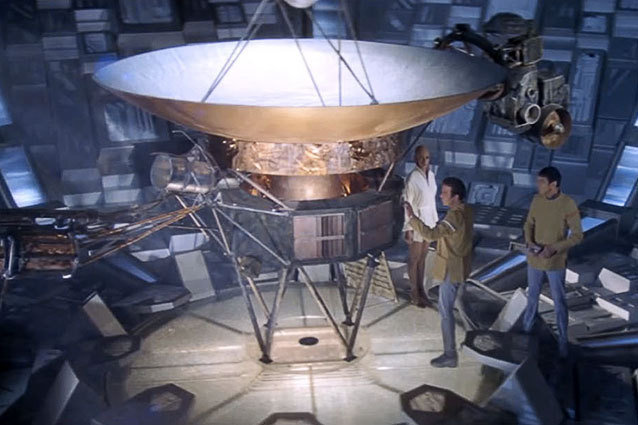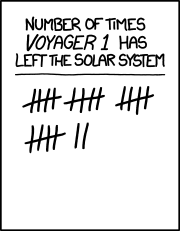Voyager 1 Enters Interstellar Space
The gun was jumped a bit back in March [http://www.escapistmagazine.com/news/view/122811-Voyager-1-Exits-the-Solar-System-UPDATED] when it was first reported that the Voyager 1 spacecraft, which launched on September 5, 1977, had left our solar system and entered interstellar space. Following the initial reports, NASA issued a statement saying that although Voyager had entered a previously unknown area of space it called "the magnetic highway," it was still within the confines of our system.
Today, however, NASA says it's official: Voyager 1 is the first human-made object to reach interstellar space. "Now that we have new, key data, we believe this is mankind's historic leap into interstellar space," said Voyager Project Scientist Ed Stone. "The Voyager team needed time to analyze those observations and make sense of them. But we can now answer the question we've all been asking -- 'Are we there yet?' Yes, we are."
Because Voyager 1 doesn't have a working plasma sensor, scientists had to rely on a fortunately-timed "coronal mass ejection" - an eruption of solar wind and magnetic fields that occurred in March 2012 and reached the probe in April 2013, providing the science team the means to measure the density of the plasma surrounding the probe and determine that it is, in fact, in interstellar space.
"We literally jumped out of our seats when we saw these oscillations in our data -- they showed us the spacecraft was in an entirely new region, comparable to what was expected in interstellar space, and totally different than in the solar bubble," Don Gurnett of the plasma wave science team at the University of Iowa said. "Clearly we had passed through the heliopause, which is the long-hypothesized boundary between the solar plasma and the interstellar plasma."
NASA's associate administrator for science John Grunsfeld described the event as "one of the most significant technological achievements in the annals of the history of science" and said it marked a new chapter in human scientific dreams and endeavors. "Perhaps some future deep space explorers will catch up with Voyager, our first interstellar envoy, and reflect on how this intrepid spacecraft helped enable their journey."
Source: NASA [http://www.jpl.nasa.gov/news/news.php?release=2013-277]
Permalink
NASA has confirmed that Voyager 1 is now officially traveling through interstellar space.The gun was jumped a bit back in March [http://www.escapistmagazine.com/news/view/122811-Voyager-1-Exits-the-Solar-System-UPDATED] when it was first reported that the Voyager 1 spacecraft, which launched on September 5, 1977, had left our solar system and entered interstellar space. Following the initial reports, NASA issued a statement saying that although Voyager had entered a previously unknown area of space it called "the magnetic highway," it was still within the confines of our system.
Today, however, NASA says it's official: Voyager 1 is the first human-made object to reach interstellar space. "Now that we have new, key data, we believe this is mankind's historic leap into interstellar space," said Voyager Project Scientist Ed Stone. "The Voyager team needed time to analyze those observations and make sense of them. But we can now answer the question we've all been asking -- 'Are we there yet?' Yes, we are."
Because Voyager 1 doesn't have a working plasma sensor, scientists had to rely on a fortunately-timed "coronal mass ejection" - an eruption of solar wind and magnetic fields that occurred in March 2012 and reached the probe in April 2013, providing the science team the means to measure the density of the plasma surrounding the probe and determine that it is, in fact, in interstellar space.
"We literally jumped out of our seats when we saw these oscillations in our data -- they showed us the spacecraft was in an entirely new region, comparable to what was expected in interstellar space, and totally different than in the solar bubble," Don Gurnett of the plasma wave science team at the University of Iowa said. "Clearly we had passed through the heliopause, which is the long-hypothesized boundary between the solar plasma and the interstellar plasma."
NASA's associate administrator for science John Grunsfeld described the event as "one of the most significant technological achievements in the annals of the history of science" and said it marked a new chapter in human scientific dreams and endeavors. "Perhaps some future deep space explorers will catch up with Voyager, our first interstellar envoy, and reflect on how this intrepid spacecraft helped enable their journey."
Source: NASA [http://www.jpl.nasa.gov/news/news.php?release=2013-277]
Permalink


